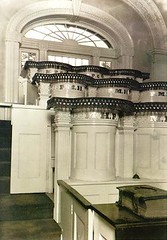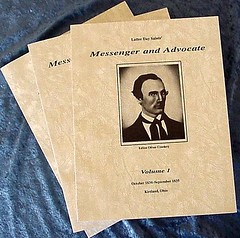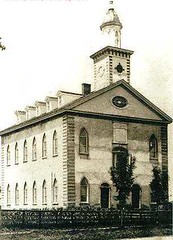More On Mitt
Rosen starts with an unconvential view of how a Mitt Romney presidential bid might plan in the Golden State, California:
California is not a swing state but a "swung" state: It has bestowed its 55 electoral votes on Democrats in every presidential election since 1988. Before '88, it elected Republican presidents six straight times.
The Golden State, then, has shifted reliably into the Democratic column, so much so that it's now taken for granted by the Party of Jackson.
Therein lies a glimmer of opportunity for the GOP, though. If a Republican candidate could land California, or even come close, he could wreak havoc at the DNC. This horrific prospect has provided dramatic fodder for The West Wing's current season, where a (moderate) Republican senator from California is the favorite to capture his home state and with it the presidency.
Could life imitate art? Possibly, if Massachusetts governor Mitt Romney has anything to say about it. Romney recently paid a visit to the Golden State to participate in the meeting of the Republican Governors' Association, of which he was named chairman.
I heard him speak at a meeting of the Fairbanks Republican Women Federated (FRWF), one of the most successful groups of its kind. His movie-star-handsome looks render him instantly appealing, at least superficially, in a state like California.
Living in California, I have to agree with Rosen, that in recent years California has been fairly strongly democratic, politically; however, there are very conservative pockets, particularly in Orange County, San Diego, and portions of the Central Valley. California has also recently elected a Republican Governor itself--though his popularity has decreased. And, all the most recent governors have been republican, with the exception of Gray Davis an unpopular democrat, who was recalled by voters. So, while a long shot, California is a possibility for a candidate like Mitt, who has conservative credentials, but is not dogmatic like George Bush.
Rosen points out Romney has garnered support in both liberal and conservative print media, and is himself a likeable political and religious minority:
But Romney's potential appeal to residents of our most populous state runs deeper than appearances. Although he is increasingly socially conservative, Romney's background and governing style — not to mention the fawning profiles that have graced the pages of both liberal and conservative magazines — suggest he might command support in California.
For one thing, the Massachusetts governor is a minority in more ways than one. As a Mormon and as a Republican in a Democratic state, he can relate to feelings of alienation from the mainstream, an ability that will promote at least a perception of his tolerance and openness — both musts in California. Perceptions matter — again, especially in California — and anything that may undercut a simplistic dismissal of him as Yet Another White Man will help. Perhaps unwittingly, Romney uses phrases like "tiny minority position" to describe his political situation.
Furthermore, his ability to run a state successfully despite the overwhelming political odds stacked against him will stand him well in a state where another Republican governor faces a similar predicament. The Massachusetts legislature is 85-percent Democratic; its entire congressional delegation are Democrats. Romney calls himself "a red speck in a blue state," which is another way of saying that he's able to maintain his redness while still working with the blue around him.
There is also a healthy LDS base in California. Numerically it is not significant; however, if mobilized, i.e., like it was in the proposition 22 campaign, the California LDS factor could very well have an impact, far beyond just numbers.
Romney has largely been successful governor in Massachusetts. While conservative, he also appeals to the political center, which would be very important in California. Then, of course, there is the successful 2002 Winter Olympics in Utah:
And indeed the governor's experience as chief executive of Massachusetts has been largely successful. He touts practical solutions that he arrived at in conjunction with the legislature, such as reforming the way the homeless are sheltered — namely, scrapping the wasteful hotel program and helping them find long-term residences — and jiggering the educational system to foster progress in math and science (on a 2005 national test, Bay State students ranked first or tied for first in math and most other subjects).
Moreover, while the governor often describes himself as a social conservative (his abortion position — a promise not to violate the state's "status quo" — is a matter of some controversy), he displays a pragmatic side even when it comes to divisive issues like stem-cell research.
He also approaches cultural issues with friendly, hard-to-disagree-with rhetoric. At the FRWF speech, he heaped praise upon David Landes's The Wealth and Poverty of Nations, a magisterial book stressing the importance of cultural norms to economic development. He quoted Abigail Adams's observation that "great necessities call out great virtues." And he urged the crowd, in his own words, to "live by principles higher than ourselves." Culture, virtue, principles — these phrases may be anathema to the California Left but, when presented with Romney's thousand-watt smile, can easily be swallowed by the vast middle.
Romney's experience as a chief executive in real life presents another appealing aspect to his persona. As the founder of Bain Capital and a successful businessman of his own making, he would be an apt replacement for the first "MBA president."
And, finally, Romney's career offers an X-factor of which no other Republican in the field can boast. As detailed in an eloquent introduction by Hawaii Governor Linda Lingle (incidentally, the first-ever female, Jewish, Republican, and non-Oahuan governor of the Aloha State), Romney fished out the 2002 Salt Lake Olympic Games from a filthy cesspool of corruption. He swooped in, cleaned house, and prepared a successful Games while avoiding the long shadow cast by both the Salt Lake shenanigans and 9/11.
Finally, Rosen points out that Romney is not tainted with much of the political scandals washing over other republican office holders or administration officials in Washington:
With some conservatives worried about serious Republican electoral trouble because of a growing number of bribery, money laundering, illegal lobbying, and obstruction of justice scandals embroiling many key figures in the GOP (in California, it's notjust the Republicans enduring such problems), Romney's D.C.-free whistle-clean image, coupled with his proven ability to transcend a corrupt mess, may prove a tempting antidote. Hopefully the pundits are wrong and the scandals will have little impact in 2006. But if they do, Mitt will be waiting in the wings.
In the end, could Romney, who hasn't yet stated whether he'll run for president, return the Golden State to the GOP? Well, to be honest, probably not. But he may well represent the Republicans' best shot.
That squeaky clean Mormon image will serve him well on a rather tainted national republican stage. I still think a Romney candidacy is a long shot. He has to overcome other better known candidates like John McCain, who is extremely popular; however, the specter of a Vice-Presidential bid is an excellent possibility. Romney is young, vibrant, and a new political figure on the national scene. He would balance out a McCain Romney ticket very well, if he can't break through the republican primary barrier in 2008. It will be an interesting political season.







0 Comments:
Post a Comment
<< Home